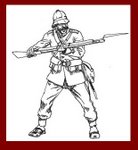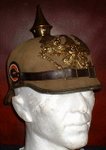
Educated at Marlborough, he entered the Royal Navy in 1852, and served as a midshipman in the Russian war, being employed on shore with the naval brigade in the siege operations before Sevastopol, mentioned in despatches, and severely wounded at the assault on the Redan on June 18, 1855, immediately afterwards he left the navy for the army. becoming a cornet in the 13th Light Dragoons. Promoted lieutenant in 1856, he exchanged into the 17th Lancers in 1857, and served in the Indian Mutiny with distinction as brigade-major of a flying column winning the Victoria Cross. In 1861 he became captain, in 1862 brevet major, exchanging about the same time into the 73rd Highlanders (Black Watch), but returned to the cavalry three years later. Having meantime served as an aide-de-camp at Dublin, he was next employed on the staff at Aldershot until 1871, when he was appointed to the 90th (now the Scottish Rifles) as a regimental major. In 1867 he had married the Hen. Mary Pauline Southwell, sister of the 4th Lord Southwell. In 1873 he was promoted brevet lieutenant-colonel, and in 1874 served in the Ashanti War (brevet-colonel); in 1874-1878 he was again on the staff at Aldershot, and in November 1875 he became regimental lieutenant-colonel, the 90th being at that time in South Africa engaged in the Kaffir War. In January 1879 he was in command of the left column of the army that crossed the Zulu frontier, and shortly afterwards he received the local rank of brigadiergeneral. Under him served Colonel Redvers Buller and also the Boer leader, Piet Uys, who fell at Ilhlobana, but the repulse at that place was more than counterbalanced by the successful battle of Kambula. At the close of the war Sir Evelyn Wood, who received the K.C.B. for his services, was appointed to command the Chatham district. But in January 1881 he was again in South Africa with the local rank of majorgeneral, and after Sir G. P. Colley's death at Majuba it fell to his lot to negotiate the armistice with General Joubert. Remaining in Natal until February 1882, he then returned to the Chatham command, having meantime been promoted substantive major-general. In 1882 he was made a G.C.M.G. and commanded a brigade in the Egyptian expedition. He remained in Egypt for six years. From 1883 to 1885 he was Sirdar of the Egyptian army, which he reorganized and in fact created. During the Nile operations of 1884-85 he commanded the forces on the line of communication of Lord Wolseley's army. In 1886 he returned to an English command, and two years later (January 1880), with the local rank of lieutenant-general, he was appointed to the Aldershot command. He became lieutenant-general in 1891, and was given the G.C.B. at the close of his tenure of the command, when he went to the War Office as quartermaster-general. Four years afterwards he became adjutant-general. he was promoted full general in 1895. He commanded the II Army Corps and Southern Command from 1901 to 1904, being promoted field marshal on the 8th of April 1903. In 1907 he became colonel of the Royal Horse Guards. After retiring from active service he took a leading part, as chairman of the Association for the City of London, in the organization of the Territorial Force.
Sir Evelyn Wood published several works, perhaps the best known of which to the soldier are Achievements of Cavalry (1897) and Cavalry in The Waterloo Campaign (1896). He also wrote The Crimea in 1854 and in 1894; an autobiography, From Midshipman to Field Marshal; and The Revolt in Hindostan.
Sir HENRY EVELYN WOOD, G.C.B., G.C.M.G., V.C.
Royal Navy, 1852-55;
Cornet, 13th Light Dragoons, 7th September 1855;
Lieutenant, 13th Light Dragoons, 1st February 1856;
Lieutenant, 17th Light Dragoons, 9th October 1858;
Captain, 17th Light Dragoons, 16th April 1860;
Captain, 73rd Foot, 21st October 1862;
Captain, 17th Foot, 10th November 1865;
Brevet Major, 19th August 1862, unattached, 22nd June 1870;
Major, 90th Foot, 28th October 1871;
Brevet Lieutenant-Colonel, 19th January 1873;
Lieutenant-Colonel, 90th Foot, 13th November 1878;
Half Pay, 15th December 1879;
Brevet Colonel, 1st April 1874;
Major-General, 12th August 1881;
Lieutenant-General, 1st April 1890;
General, 26th March 1895;
Field-Marshal, 8th April 1903;
Colonel of Royal Horse Guards, 16th November 1907.
Served in Naval Brigade in Crimea as A.D.C. to Captain Peel from 1st October 1854 to 18th June 1855; carried scaling ladders at attack on Redan, and severely wounded (mentioned in despatches, medal with two clasps, Knight of Legion of Honour, 5th class of Medjidie, and Turkish War medal).
Served in India in 1858 as Brigade Major of Somerset's Brigade; present at Rajghur, Sindwaho, Kharee, and Barode (twice mentioned in despatches, medal). Employed in hunting down rebels during 1859-60, while commanding Beatson's Horse (thanked by Government for an attack on a band in 1859; gazetted to the Victoria Cross for gallantry on 19th October 1858, and also on another occasion). Raised the 2nd Central India Horse.
Served on the Gold Coast in September 1873, on special service with Sir Garnet Wolseley; served through the Ashanti War of 1873-74; organised Wood's Regiment (natives); commanded the attacking force at Essainan; and the troops at the head of the road, following the enemy from Mensu to the Prah before the arrival of the European troops; present at the reconnaissance in force of November 27; commanded right column at battle of Amoaful; slightly wounded; commanded headquarters of his regiment at the battle of Ordahsu, and at the capture of Coomassie (several mentions in despatches, Brevet of Colonel, C.B., and medal with clasp).
Gaika War of 1878, in command of a column (despatches).
Zulu War, 1879, in command of No. 4 Column; raised "Wood's Irregulars," a Zulu regiment; two days after Isandlwana he defeated a force of several thousand Zulus by surprise, and then maintained the advanced position thus obtained (commended by High Commissioner and nominated K.C.B.); defeated the Zulus at Kambula on March 29th; Brigadier-General in April; led the advance on Ulundi with a flying column, and was present at the battle (despatches, medal, with clasps).
Boer War, 1881, as Major-General, and on the death of General Colley, as Governor of Natal and Commander-in-Chief of the British forces (G.C.M.G.)
Egyptian War of 1882; commanded the 4th Brigade near Alexandria, including the surrender of Kafr Dowar and Damietta (mentioned in despatches, thanks of both Houses of Parliament, medal, 2nd class of Medjidie, and Khedive's star).
Nile Expedition, 1884-85; in command of the line of communications (mentioned in despatches, 1st class of the Medjidie, clasp).































6 comments:
From naval midshipman to army field marshal, this could give our good friend Tas a few ideas....)
Indeed it does! Perhaps this means I can look forward to being a General one day? :-D
Tas said...
Indeed it does! Perhaps this means I can look forward to being a General one day? :-D
Well the precedent has been set!
Talk about an interesting career,
wow!
Impressive career to be sure!
Oh Tas you are already a general,
every gamer is ;-D
Excellent point la coloniale!
Tas said...
Excellent point la coloniale!
He swerves into one every so often ;-P
Post a Comment